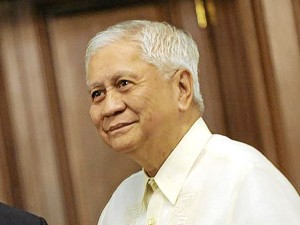Philippines seeks peace with China anew
Instead of lashing out at the Global Times of China for calling for economic sanctions against the Philippines, Foreign Secretary Albert del Rosario has urged Beijing anew to fully concur with Manila’s stated position on the West Philippine Sea (South China Sea) issue.
And that is, to resolve the Spratlys dispute peacefully in accordance with international law, particularly the United Nations Convention on the Law of the Sea or Unclos.
Contacted in Iraq where he is on an official visit, Del Rosario said on Sunday the government was “certain China will fully concur with our stated position” on the issue.
“Our relations with China as we have said should be governed by mutual respect, equality and observance of each other’s sovereignty,” the foreign secretary told the Philippine Daily Inquirer.
Raul Hernandez, the DFA spokesperson, would not comment.
Article continues after this advertisement“Let Secretary Del Rosario’s comment stand on its own,” he said.
Article continues after this advertisementA recent editorial in the Global Times, which is published by the Communist Party of China’s mouthpiece, the People’s Daily, said China should impose sanctions on the Philippines for offering to allow more United States troops on its soil.
It also said that Beijing “must respond” to the move by using its “leverage to cut economic activities” between the Philippines and other Southeast Asian countries.
China should also consider “cooling down” business links with Manila, asserted the editorial published in the Chinese and English versions of the newspaper.
“It should show China’s neighboring areas that balancing China by siding with the US is not a good choice. Well-measured sanctions against the Philippines will make it ponder the choice of losing a friend such as China and being a vain partner of the US,” it also said in the editorial that appeared during the north Asian country’s week-long Lunar New Year holiday.
Aggressive acts
The Philippines and China, as well as Vietnam, Malaysia, Brunei and Taiwan, have staked rival claims to parts of the West Philippine Sea, home to some of the world’s most important shipping lanes and believed to hold vast deposits of fossil fuels.
Manila and Hanoi recently complained of allegedly increasing aggressive acts by China in the disputed waters.
The alleged acts included a Chinese naval ship firing warning shots at Filipino fishermen, fueling fears among nations in the region about China as its military, political and economic strength grows.
Sound of cannons
Washington has planned to increase its military presence in the Asia Pacific in a strategic shift that has angered Beijing.
In October, Del Rosario dismissed as “grossly irresponsible” a Global Times warning that nations involved in territorial disputes in the South China Sea should “mentally prepare for the sound of cannons,” if they remained at loggerheads with China.
Del Rosario had also pointed out that the statement was “in contrast to the Philippine position which seeks an Unclos-based solution to the West Philippine Sea issue.”
In that strongly worded editorial published in its Chinese and English editions, the Global Times accused the Philippines and Vietnam of taking advantage of China’s “mild diplomatic stance” to push their own agenda.
“If these countries don’t change their ways with China, they will need to mentally prepare for the sound of cannons. We need to be ready for that, as it may be the only way for the disputes in the seas to be resolved,” the paper had said, adding that “if the situation turns ugly, some military action (by China) is necessary.”
Earlier, in a text message, Del Rosario had said that “as close friends with incredible people-to-people ties, China and the Philippines are endeavoring to manage whatever challenges there are in a constructive manner on the basis of equality, respect and understanding.”
“For the record, we do place great value in our relations with China,” he had also said.
The Philippines, he had noted, is “working with the Association of Southeast Asian Nations to have the elements of our actionable framework towards segregating the disputed from the undisputed areas to be included in the drafting of the Code of Conduct (among Spratlys claimant-countries). We are also exploring how best to pursue a dispute settlement mechanism among the options offered under Unclos for the purpose of validating our claim.”
In yet another text message, Del Rosario had pointed out that Manila and Beijing “have had a longstanding friendship.”
“However, even true friends encounter challenges, which serve to test their relationship.”
For comprehensive coverage, in-depth analysis, visit our special page for West Philippine Sea updates. Stay informed with articles, videos, and expert opinions.
